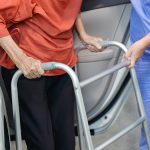-
December 16: The Week in Cancer News
A second KRAS inhibitor is approved for lung cancer, and a BTK inhibitor challenges standard of care for relapsed or refractory CLL.
by Marci A. Landsmann
-
December 2: The Week in Cancer News
Oncologists report that prior authorization process interrupts cancer care, and plant-based diet is associated with lower colorectal cancer risk in men but not women.
by Eric Fitzsimmons
-
November 4: The Week in Cancer News
Female patients less likely than men to be told about sexual side effects of treatment, and independent analysis finds cancer-causing chemical in dry shampoo.
by Marci A. Landsmann
-
October 14: The Week in Cancer News
Colonoscopy study results are misreported, and progress is seen in cancer vaccines.
by Kevin McLaughlin
-
October 7: The Week in Cancer News
Transportation barriers increase risk of death for people with cancer, and new rules go into effect to give patients full access to medical records.
by Marci A. Landsmann
-
September 23: The Week in Cancer News
AACR Cancer Progress Report 2022 shows continued decline in cancer death rates, and genetic tests create opportunities but also confusion for breast cancer patients.
by Eric Fitzsimmons
-
September 16: The Week In Cancer News
Air pollution research provides clues to how cancer starts, and KRAS-targeting drug appears to keep cancer at bay longer than standard of care, but questions remain
by Marci A. Landsmann
-
September 9: The Week in Cancer News
Early-onset cancer is increasing globally, and testing population-wide preventive DNA testing.
by Kevin McLaughlin
-
September 2: The Week in Cancer News
Fertility preservation does not impact outcomes for breast cancer patients, and ultraprocessed foods linked to increased risk of colorectal cancer in men.
by Thomas Celona
-
August 26: The Week in Cancer News
Advanced cervical cancer rates are rising despite prevention and screening tools, and CAR T-cell therapy inaccessible to many across the country.
by Eric Fitzsimmons
Cancer Talk
Living With Your Loved One’s Prostate Cancer
Christine Ledbetter on the ways her husband’s prostate cancer affected their relationship and finding support as a caregiver.
by Christine Ledbetter
Continuing the ConversationThe AACR hosts a roundtable to ‘get real’ about cancer health disparities.
by Marci A. Landsmann
More Patients Participating in Cancer ResearchA higher proportion of cancer patients are enrolling in research studies than previously thought, but many patients lack the access needed to participate.
by Kyle Bagenstose
Immunotherapy Drug Tarlatamab Approved for Advanced Small Cell Lung CancerThe drug showed promise in treating small cell lung cancer that had progressed during or after chemotherapy.
by Laura Gesualdi-Gilmore













